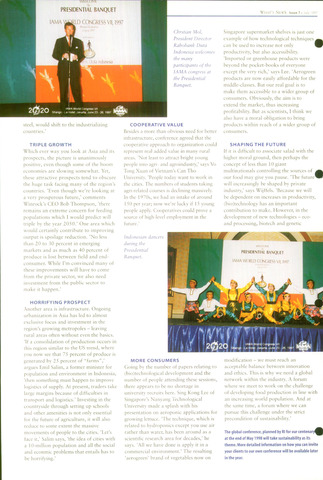PRESIDENTIAL BANQUET
LD CONGRESS VII. 1997
9
WH< <)\ll
Slwnnti-lj.|dk«irla
2 4 lurK' I9d
)uta indonesia
WHAT'S News Issue 7 July 1997
Chrstian Mol,
President Director
Rabobank Duta
Indonesia welcomes
the many
participants of the
IAMA congress at
the Presidential
Banquet.
steel, would shift to the industrializing
countries.'
TRIPLE GROWTH
Which ever way you look at Asia and its
prospects, the picture is unanimously
positive, even though some of the boom
economies are slowing somewhat. Yet,
these attractive prospects tend to obscure
the huge task facing many of the region's
countries. 'Even though we're looking at
a very prosperous future,' comments
Winrock's CEO Bob Thompson, 'there
remains an extreme concern for feeding
populations which I would predict will
triple by the year 2050.' One area which
would certainly contribute to improving
output is spoilage reduction. 'No less
than 20 to 30 percent in emerging
markets and as much as 40 percent of
produce is lost between field and end-
consumer. While I'm convinced many of
these improvements will have to come
from the private sector, we also need
investment from the public sector to
make it happen.'
COOPERATIVE VALUE
Besides a more than obvious need for better
infrastructure, conference agreed that the
cooperative approach to organization could
represent real added value in many rural
areas. 'Not least to attract bright young
people into agri- and agroindustry,' says Vo
Tong Xuan of Vietnam's Can Tho
University. 'People today want to work in
the cities. The numbers of students taking
agri-related courses is declining massively.
In the 1970s, we had an intake of around
150 per year; now we're lucky if 15 young
people apply. Cooperatives could prove a
source of high-level employment in the
future.'
Indonesian dancers
during the
Presidential
Banquet.
Singapore supermarket shelves is just one
example of how technological techniques j
can be used to increase not only
productivity, but also accessibility.
'Imported or greenhouse products were
beyond the pocket-books of everyone
except the very rich,' says Lee. 'Aerogreen
products are now easily affordable for the
middle-classes. But our real goal is to
make them accessible to a wider group of
consumers. Obviously, the aim is to
extend the market, thus increasing
profitability. But as scientists, I think we
also have a moral obligation to bring
products within reach of a wider group of
consumers.
SHAP1NG THE FUTURE
If it is difficult to associate salad with the
higher moral ground, then perhaps the
concept of less than 10 giant
multinationals controlling the sources of m
our food may give you pause. 'The future™
will increasingly be shaped by private
industry,' says Wijffels. 'Because we will
be dependent on increases in productivity,
(bio)technology has an important
contribution to make. However, in the
development of new technologies - eco-
and processing, biotech and genetic
HORRIFYING PROSPECT
Another area is infrastructure. Ongoing
urbanization in Asia has led to almost
exclusive focus and investment in the
region's growing metropoles - leaving
rural areas often without even the basics.
'If a consolidation of production occurs in
this region similar to the US trend, where
you now see that 75 percent of produce is
generated by 25 percent of "farms",'
argues Emil Salim, a former minister for
population and environment in Indonesia,
'then something must happen to improve
logistics of supply. At present, traders take
large margins because of difficulties in
transport and logistics.' Investing in the
countryside through setting up schools
and other amenities is not only essential
for the future of agriculture, it will also
reduce to some extent the massive
movements of people to the cities. 'Let's
face it,' Salim says, 'the idea of cities with
a 10-million population and all the social
and econmic problems that entails has to
be horrifying.'
MORE CONSUMERS
Going by the number of papers relating to
(bio)technological development and the
number of people attending these sessions,
there appears to be no shortage in
university recruits here. Sing Kong Lee of
Singapore's Nanyang Technological
University made a splash with his
presentation on aeroponic applications for
growing lettuce. 'The technique, which is
related to hydroponics except you use air
rather than water, has been around as a
scientific research area for decades,' he
says. 'All we have done is apply it in a
commercial environment.' The resulting
'aerogreen' brand of vegetables now on
modification - we must reach an
acceptable balance between innovation
and ethics. This is why we need a global
network within the industry. A forum
where we meet to work on the challenge
of developing food production in line with
an increasing world population. And at
the same time, a forum where we can
pursue this challenge under the strict
precondition of sustainability.'
The global conference, planned by Rl for our centenary^ft
at the end of May 1998 will take sustainability as its
theme. More detailed information on how you can invite
your dients to our own conference will be available later
in the year.
WEICOMl
PRESIDENTIAL BANQUET
IAMA WORLD CONGRESS VII, 1997

